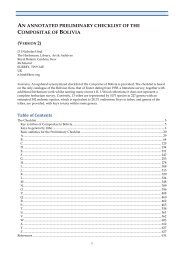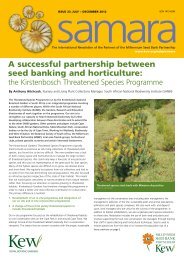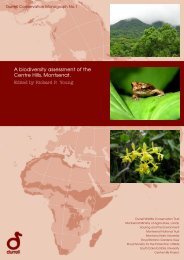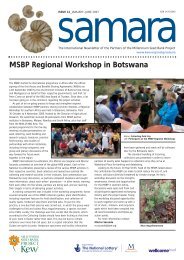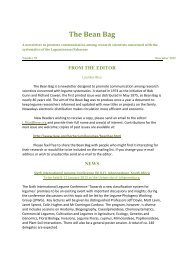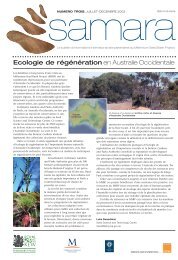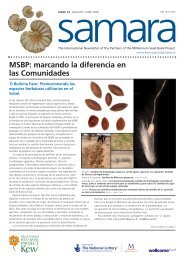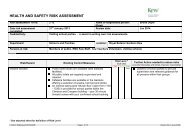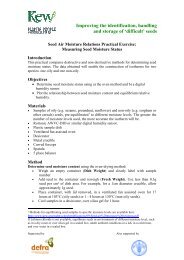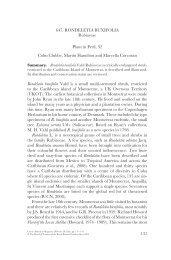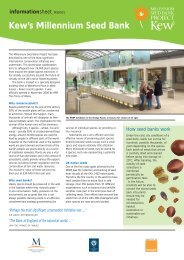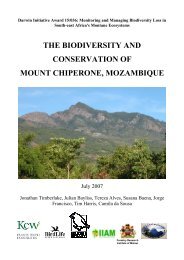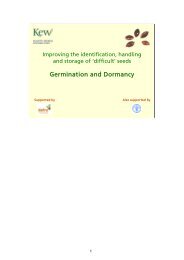Improving the identification, handling and storage of âdifficultâ seeds ...
Improving the identification, handling and storage of âdifficultâ seeds ...
Improving the identification, handling and storage of âdifficultâ seeds ...
Create successful ePaper yourself
Turn your PDF publications into a flip-book with our unique Google optimized e-Paper software.
5.3. GROUP 2 report<br />
Group members<br />
▪ Samuel Bennett-Lartey<br />
▪ Peterson Wambugu<br />
▪ Sebili Naha<br />
▪ Jose Menezes<br />
1. Reasons for “difficult” <strong>seeds</strong><br />
▪<br />
▪<br />
▪<br />
▪<br />
Andre Lezar<br />
Frank Sichone<br />
Eduardo Morillo<br />
Robin Probert<br />
Species<br />
Reason<br />
Cleome gyn<strong>and</strong>ra ▪ Dormancy<br />
Amaranthus sp. ▪ Some are dormant<br />
Corchorus sp. ▪ Dormancy<br />
Gossypium sp. ▪ Oil content?<br />
▪ Climate cool <strong>and</strong> moist<br />
▪ Immature<br />
▪ Storage<br />
Helianthus annuus ▪ Oil content?<br />
▪ Climate cool <strong>and</strong> moist<br />
▪ Immature<br />
▪ Storage<br />
Avena sp.<br />
Dormancy<br />
Abelmoschus esculentus<br />
Physical dormancy<br />
Vigna subterranean<br />
Immaturity (leave in pods)<br />
Arachis hypogaea<br />
Immaturity (leave in pods)<br />
Allium Isp.<br />
Inherently short lived, small embryo<br />
Daucus carota<br />
Variation in seed maturity<br />
Oryza sp.<br />
Dormancy<br />
Research needed into underst<strong>and</strong>ing natural dormancy breaking – ecosystems.<br />
2. Training priorities<br />
▪ Seed physiology<br />
- Specialized training in seed physiology<br />
▪ Seed dormancy studies<br />
- Species by species on how to h<strong>and</strong>le each<br />
- Include basic principals on what to do for species that are not in such a manual.<br />
▪ Purity <strong>of</strong> samples<br />
- Removing immature, damaged <strong>and</strong> empty <strong>seeds</strong><br />
▪ Equipment <strong>of</strong>ten supplied without technical support<br />
- Training or sharing <strong>of</strong> laboratory management skills (knowledge <strong>of</strong> equipment <strong>and</strong><br />
available expertise) <strong>and</strong> quality assurance<br />
▪ Risk associated with conservation <strong>of</strong> recalcitrants in field gene banks<br />
- Cryo-<strong>storage</strong> training for SADC gene banks. University <strong>of</strong> KZN = Darwin funding for<br />
training<br />
▪ On-farm approach<br />
- Need social skills to succeed, learn from NGO’s<br />
Training recommendations:<br />
▪ Training need to be h<strong>and</strong>s-on, practical <strong>and</strong> extensive<br />
▪ Level 1: training <strong>the</strong> trainers – Kew<br />
▪ Level 2: training <strong>of</strong> technicians - regional



